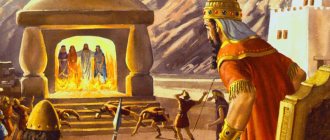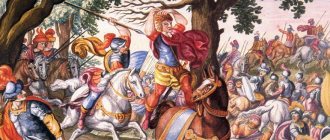Books of the Old Testament: 39 books.
Books written before the birth of Christ. They prepared people for the coming of the Savior.
5 books (Pentateuch of Moses):
Genesis, Exodus, Leviticus, Numbers, Deuteronomy.
They introduce the history of the creation of the world and man, and also include the Law that God gave people for their lives.
12 books:
Two Books of Chronicles, 1 Ezra, Nehemiah, Esther, Joshua, Judges of Israel, Ruth, Four Books of Kings
Contains the history of the people of Israel before the Savior came into the world.
5 books
Ecclesiastes (Preacher), Song of Songs, Job, Psalter, Proverbs of Solomon
Contain God's teaching about piety, righteousness, wisdom and love.
17 books
Isaiah, Habakkuk, Zephaniah, Haggai, Zechariah, Malachi, Jeremiah, Amos, Obadiah, Jonah, Micah, Nahum, Lamentations, Ezekiel, Daniel, Hosea, Joel.
Written by the prophets of God, who spoke to the people of Israel about the future coming into the world of Christ the Savior.
Introduction.
The book of Genesis is the book of beginnings, a stunning account of the origins of man and the universe, the invasion of the world by sin and its catastrophic effect on the human race, and the beginning of God's plan for the salvation of mankind.
The Hebrew title of the book, “bereshit” (“in the beginning”), is also the first word in this book. The Russian title "Genesis" corresponds to the literal translation of its Greek title in the Septuagint, which in turn is a translation of the Hebrew word "toledot", a key word in this book. The word "toledot" means "origin", and it perfectly conveys the main meaning of the first book of the Holy Scriptures. This word appears frequently in the book and is synonymous with the word “being,” that is, “that which was.”
Books of the New Testament: 27 books
Books written after the Nativity of Christ and His ministry to people. Includes the teaching of Christ and His closest disciples about salvation and the Kingdom of Heaven.
4 books (Gospels)
Gospel of Matthew, Gospel of Mark, Gospel of Luke, Gospel of John.
They include the story of the apostles about the life of Jesus Christ, His suffering, death and resurrection, and also reveal His teaching - the Gospel (Good News).
21 books (7 Council Epistles and 14 Epistles of the Apostle Paul)
Two messages from St. Paul to the Corinthians, Epistle of St. Paul to the Galatians, Epistle of St. Paul to the Ephesians, Epistle of St. James, two epistles of St. Peter, three epistles of St. John, Epistle of St. Jude, Epistle of St. Paul to the Romans, Epistle of St. Paul to the Philippians, Epistle of St. Paul to the Colossians, two epistles of St. Paul to the Thessalonians, two epistles of St. Paul to Timothy, Epistle of St. Paul to Titus, Epistle of St. Paul to Philemon, Epistle of St. Paul to the Hebrews.
They contain the teachings of the apostles about God, the Church, faith, as well as various spiritual and moral instructions.
1 book
Acts of the Holy Apostles
Tells about the descent of the Holy Spirit on the apostles, the birth of the Church and the initial spread of Christianity throughout the world.
1 book
Revelation of John the Evangelist (Apocalypse)
Tells about the future destinies of the Church and the world.
Read GENESIS chapter 1
Listen to Genesis chapter 1 online
1 In the beginning God created the heavens and the earth.
2 And the earth was formless and void, and darkness was upon the deep, and the Spirit of God hovered over the waters.
3 And God said, Let there be light. And there was light.
First day of creation. Artist Y. Sh von KAROLSFELD
4 And God saw the light that it was good, and God separated the light from the darkness.
5 And God called the light day and the darkness night. And there was evening and there was morning: one day.
6 And God said, Let there be a firmament in the midst of the waters, and let it separate water from water. [And it became so.]
7 And God made the firmament, and separated the waters that were under the firmament from the waters that were above the firmament. And so it became.
8 And God called the expanse heaven. [And God saw that it was good.] And there was evening, and there was morning: the second day.
9 And God said, Let the waters under the heaven be gathered into one place, and let the dry land appear. And so it became. [And the waters under the sky gathered into their places, and dry land appeared.]
10 And God called the dry land earth, and the meeting of the waters he called seas. And God saw that it was good.
Second day of creation. Artist Y. Sh von KAROLSFELD
11 And God said, “Let the earth bring forth green plants, grass yielding seed [after its kind and after its likeness, and] a fruitful tree bearing fruit according to its kind, in which is its seed on the earth.” And so it became.
12 And the earth brought forth grass, grass yielding seed according to its kind [and likeness], and a tree [fruitful] bearing fruit, in which is its seed according to its kind [on the earth]. And God saw that it was good.
13 And there was evening, and there was morning: the third day.
Third day of creation. Artist Y. Sh von KAROLSFELD
14 And God said: Let there be lights in the expanse of the heaven [to illuminate the earth and] to separate the day from the night, and for signs, and for seasons, and for days, and for years;
15 And let them be lights in the expanse of the heaven to give light on the earth. And so it became.
16 And God made two great lights: the greater light to rule the day, and the lesser light to rule the night, and the stars;
17 And God set them in the firmament of the heaven to give light on the earth,
18 And to rule the day and the night, and to separate the light from the darkness. And God saw that it was good.
19 And there was evening and there was morning: the fourth day.
Fourth day of creation. Artist Y. Sh von KAROLSFELD
20 And God said, Let the water bring forth living things; and let the birds fly over the earth, across the firmament of heaven. [And it became so.]
21 And God created the great fish and every living creature that moves, which the waters brought forth, according to their kinds, and every winged bird according to its kind. And God saw that it was good.
22 And God blessed them, saying, Be fruitful and multiply, and fill the waters of the seas, and let birds multiply on the earth.
23 And there was evening, and there was morning: the fifth day.
Fifth day of creation. Artist Y. Sh von KAROLSFELD
24 And God said, Let the earth produce living creatures according to their kinds, cattle and creeping things and wild beasts of the earth after their kinds. And so it became.
25 And God made the beasts of the earth according to their kinds, and the cattle according to their kinds, and every creeping thing that creeps on the earth according to their kinds. And God saw that it was good.
26 And God said, Let us make man in our image, after our likeness, and let them have dominion over the fish of the sea, and over the birds of the air, and over the cattle, and over all the earth, and over every creeping thing, reptiles on the ground.
27 And God created man in His own image, in the image of God He created him; male and female he created them.
28 And God blessed them, and God said to them: Be fruitful and multiply, and fill the earth, and subdue it, and have dominion over the fish of the sea [and over the animals], and over the birds of the air, [and over every livestock, and over all the earth, ] and over every living thing that moves on the earth.
Sixth day of creation. Artist Y. Sh von KAROLSFELD
29 And God said, Behold, I have given you every herb yielding seed that is on all the earth, and every tree that has fruit yielding seed; - This will be food for you;
30 And to every beast of the earth, and to every bird of the air, and to every [creeping thing] that creeps on the earth, in which there is life, I have given every green herb for food. And so it became.
31 And God saw everything that He had made, and behold, it was very good. And there was evening and there was morning: the sixth day.
| Interpretation of the first chapter of the book of Genesis by A.P. Lopukhina |
| Interpretation of the first chapter of the book of Genesis by St. Ephraim the Syrian |
Section I. Pentateuch of Moses
The center of all legislation was, of course, the Decalogue ( Ex. 20:2–17
). All other commandments are to some extent its revelation and interpretation. The law given in the desert, in “no man’s land,” is not intended for a specific country, but has a universal significance. It is customary to say that the commandments of the Decalogue lie at the basis of universal morality. This is true because the law corresponds to human nature. His commandments provide the correct guidelines for the development of the human soul, which is created for a moral life, and not vice versa. An immoral life is destructive for a person. True, one should be careful here, because when talking about universal human values, the Decalogue is often significantly shortened. If you ask a modern “secular” schoolchild whether he has heard about the commandments, he will answer positively. If he is then asked to list them, he will start with the sixth (the fifth is currently unpopular). But the first four traditionally cause difficulties. This is no coincidence, since the first four commandments are not considered by many to be “universal human values.” But without them there are no values left at all.
The emptiness of “autonomous” ethics is demonstrated by the Gospel story with the rich young man ( Matthew 19:16–24
and parallel). He kept the 5th–10th commandments, but did not want to fulfill the 1st in full, and therefore cannot enter the Kingdom of Heaven.
The first part of the Decalogue gives the remaining moral instructions absolute meaning, because God himself is absolute, God is absolute good. Moral postulates that are not correlated with God have no absolute value. If we know that “thou shalt not kill”,
because God commanded so, then there is no escape, even if we cannot explain it (although we can), because you cannot argue with God.
If “thou shalt not kill
,” because it is simply not good, is not accepted, then the Smerdyakov principle comes into play: “if there is no God, then everything is permitted.” If God is not the source, guardian and guarantor of these commandments, then what, exactly, can keep me from breaking them? Nothing.
This is precisely the fundamental difference between the Law of Moses and ordinary legislation. Conventional legislation serves to mutually limit human egoism. Each act is judged in terms of the damage caused or potential damage. Here things are different. The Mosaic Law condemns many acts simply because they are an abomination to God. And no matter how people justify them, or talk about their benefits or harmlessness, this does not change the matter. The law contains a direct reference to the will of God and requires obedience to it. Let me give you a striking example. “You must have a place outside the camp where you can go out; besides your weapon you must have a spatula; and when you sit outside [the camp], dig [a hole] with it and again cover [it] with your excrement; For the Lord your God walks in the midst of your camp to deliver you and deliver your enemies [into your hands], and [therefore] your camp must be holy, so that He does not see anything shameful in you and turn away from you.”
(
Deut. 23:12–14
). It would seem that a purely hygienic norm has a high justification - there should be no uncleanness unworthy of the presence of God.
We mentioned above that the Law was supposed to guide a person to a moral life. The basis (and content too) of moral life is union with God, abiding with Him.
Sin, in turn (according to the meaning of the term itself from the Greek αμαρτία - failure, deviation) is an action that takes a person away from God and prevents union with Him. Therefore, denouncing certain actions, the Law points to certain states of the soul behind them that are destructive to it.
As already mentioned, the Sinai legislation contains a wide range of different laws. We can study in detail their various economic, social and other aspects, but we are not interested in this, but in what the New Testament primarily draws our attention to. “Woe to you, scribes and Pharisees, hypocrites, because you tithe mint, anise and caraway seeds, and have abandoned the most important things in the law: judgment, mercy and faith; this had to be done, and this should not be abandoned.”
(
Matt. 23:23
).
Let's look at this with specific examples.
«Let there be one law both for the natural resident and for the stranger who has settled among you.”
(
Ex. 12:49
). This was rare in those days, equality of rights between a natural resident and an alien. Usually it was (and still is) completely different.
«Fathers should not be punished with death for their children, and children should not be punished with death for their fathers; everyone must be punished by death for his crime."
(
Deut. 24:16
).
Regarding judgment, the Law says: “Do not listen to empty rumors, do not give your hand to the wicked to be a witness to untruth. Don't follow the majority out of spite
, and do not resolve litigation by deviating from the majority of the truth;
and do not condone the needy
’s troubles”
( Ex. 23:1–3
).
The main principle of democracy: “the majority is always right” and the communist slogan that the poor are always right are rejected here. When demanding to protect the widow, to protect the orphan and the wretched, it is nevertheless stipulated: “ Do not condone the poor in his litigation,”
poverty cannot be an excuse for wickedness, the court must be fair.
However, for those who cannot stand up for themselves at all, the Law is lenient. “Do not hand over a slave to his master when he comes running to you from his master;
let him live with you, among you, in a place that he chooses in one of your dwellings, where he likes it; do not oppress him” (
Deut. 23:15–16
), because otherwise he will face punishment. Let us also note that people usually do not run away from a good life. If the reason for the flight was a crime, then, obviously, he was supposed to be tried in the usual way.
The law proclaims the principle of equal retribution: “an eye for an eye and a tooth for a tooth.”
(
Lev. 24:20, Exod. 21:24
). For those times, this was a fair and useful ruling: not a head for an eye, not a hundred people for one tooth, but equal retribution. However, in cases of serious bodily injury, it was necessary to pay for treatment and disability, and in cases of theft, compensation was usually expected to be 4-5 times the amount.
If a person bears false witness against someone and is caught in this, then he should be subjected to the same execution that would have been suffered by the one against whom he bore false witness. It should be noted here that for each of the commandments of the Decalogue, except for the 10th, there are certain conditions under which its violation is punishable by death.
As already mentioned, the law limits the possibilities of blood feud. Intentional murder was punishable by execution, but a person who committed murder unintentionally had the opportunity to take refuge in one of the cities of refuge discussed above.
The Law says that if someone's ox gores a person to death, then its owner is not guilty. However, if the owner knew yesterday and the next day that his ox was gore, and did not take any measures, then the owner is subject to death ( Ex. 21:28–29
), – in this case, criminal negligence is implied, that is, not only the action is assessed, but also the attitude towards it, the degree of conscious participation.
The law speaks not only about justice, but also about mercy towards others, especially those in need, elevating it to the rank of a commandment.
“When you reap the harvest of your land, do not reap to the edge of your field, and do not glean what is left of your harvest, and do not strip your vineyard clean, and do not glean the grapes that fall in the vineyard; leave it to the poor and the stranger. I am the Lord your God.
Don't steal, lie or deceive each other. Do not swear falsely by My name, and do not dishonor the name of your God. I am the Lord. Do not offend your neighbor and do not rob. The mercenary's payment should not remain with you until the morning."
(
A lion. 19:9–13
).
The fifteenth chapter of Deuteronomy discusses three degrees of need - poverty, destitution and selling oneself into slavery.
«If you lend money to the poor of My people, do not oppress him or impose an increase on him. If you take your neighbor's clothing as a pledge, return it before the sun sets, for it is his only covering, it is the clothing of his body: what will he sleep in? So when he cries to Me, I will hear, for I am merciful.”
(
Ex. 22:25–27
) - this commandment contains a direct call for compassion, concern for mercy more than justice.
“If he [your neighbor] is a poor man, then do not go to bed with his deposit: return the deposit to him at sunset, so that he can go to bed in his clothes and bless you, and this will be counted towards your
righteousness. before the Lord your God"
( Deut. 24:12–13
).
It is said about the beggar: “Give to him [loan], and when you give to him, your heart should not grieve.”
, for therefore the Lord your God will bless you in all your works and in everything that will be done with your hands;
for the poor will always be in the midst of [thy] land; therefore I command you: open your hand to your brother, to your poor and to your needy in your land” ( Deut. 15:10–11
).
In the seventh year, all debts to fellow tribesmen were forgiven and slaves were set free. When releasing him, the owner had to give him what he needed to live from his property. " Don't consider this a burden for yourself.
, that you should set him free from you, because at the age of six he earned you twice the wages of a mercenary;
and the Lord your God will bless you in everything you do” ( Deut. 15:18
).
Please note that we are talking not only about the external side of the matter, but also about the internal disposition of the heart, without which there is no virtue.
“If you find your enemy’s ox or his donkey lost, bring it to him; If you see your enemy’s donkey fallen under his burden, do not leave him; unload with him"
(
Ex. 23:4–5
). In this case, the commandment is established specifically in relation to the enemy. The Monk Isidore Pelusiot, explaining its meaning, writes that God gave it “not so much with concern for the animal, but most of all for the sake of the people themselves. An enemy who comes to raise a fallen animal will, without a doubt, enter into a conversation with the enemy and say: “You raise it there, and I will raise it here.” Conversation is the beginning of reconciliation and the path leading to friendship. Therefore, Divine Silence tried to achieve three wonderful goals: the first - so that the animal does not die, the second - so that the owner does not suffer a loss, and the third - so that the enemies are reconciled and become friends. For to whom good has been done, even if he is more insensitive than stones, he will try to reward the benefactor, and those recognized as a benefactor, of course, will no longer be considered an enemy. Do you see how ineffable Wisdom legitimizes everything, meaning goodness and love for mankind?”142.
A number of commandments directly indicate what should be the attitude towards other people. “ Rise up before the face of the gray-haired man, and honor the face of the old man, and fear [the Lord] your God.”
(
Lev. 19:32
). Sometimes the purely pragmatic meaning of a particular commandment is completely unclear. You can fulfill them only by having faith in the One who established them.
«Cursed is he who leads the blind astray!... Cursed is he who misjudges the stranger, the orphan and the widow!”
(
Deut. 27:18–19
).
“Do not speak evil of the deaf, and do not place anything before the blind to cause him to stumble;
fear the [Lord] your God. I am the Lord [your God]” (
Lev. 19:14
).
A deaf person does not suffer damage from slander, which means that the point is not this, but the disposition of the one who does this, “for everyone who practices unrighteousness is an abomination to the Lord your God”
(
Deut. 25:16).
Obviously, the above quotes are enough to make sure that, pointing to mercy, judgment and faith in the Law, the Lord Jesus Christ was not appealing to something unknown. It is no coincidence that when asked by a lawyer: “What is the greatest commandment in the law?”
“The Savior answered:
“Thou shalt love the Lord thy God with all thy heart, and with all thy soul, and with all thy mind.
This is the first and greatest commandment; the second is similar to it: love your neighbor as yourself; on these two commandments hang all the law and the prophets” (
Matthew 22:37–40
).
“Don’t owe anyone anything,
- writes the Apostle Paul -
except for mutual love;
For he who loves another has fulfilled the law. For the commandments: do not commit adultery, do not kill, do not steal, do not bear false witness, do not covet someone else’s, and all the others are contained in this word: love your neighbor as yourself. Love does not harm one's neighbor; Therefore love is the fulfilling of the law” (
Rom. 13:8–10
).







